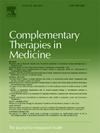慢性非癌性疼痛管理的替代疗法:随机对照试验的范围综述
IF 3.5
3区 医学
Q1 INTEGRATIVE & COMPLEMENTARY MEDICINE
引用次数: 0
摘要
慢性疼痛是现代社会中最具挑战性的健康问题之一,给个人和医疗保健系统带来了巨大的负担。虽然药物治疗仍然是疼痛管理的主要方法,但其局限性往往限制了临床医生和患者的选择。相比之下,补充疗法因其潜在的有效性和安全性而获得认可。然而,目前的文献缺乏对辅助疗法在慢性疼痛管理中的作用的全面总结。目的综述慢性非癌性疼痛的辅助治疗方法,评估其实际应用,识别研究空白和局限性,为慢性非癌性疼痛治疗和个性化疼痛治疗策略的发展提供综合视角。方法本综述遵循PRISMA-ScR指南。用关键词“慢性疼痛”和“辅助治疗”从PubMed和Web of Science检索了近十年发表的随机对照试验(rct)。非英语研究被排除在外。结果共纳入rct 848项,其中128项符合纳入标准。纳入的研究涉及慢性肌肉骨骼疼痛(102项研究)、慢性内脏疼痛(5项研究)、慢性神经性疼痛(7项研究)和13项未指定疼痛类型的研究。研究的补充疗法包括针灸、手工疗法、运动疗法、心理干预、身心疗法和物理疗法。结论本综述为辅助疗法治疗慢性非癌性疼痛的有效性和安全性提供了初步证据。然而,在纳入的研究中发现了方法和质量相关的局限性。需要未来高质量的随机对照试验来验证这些疗法的长期疗效,探索其作用机制,并为其临床应用提供更有力的证据。此范围审查已在开放科学框架(OSF)上注册,DOI: https://doi.org/10.17605/OSF.IO/67K32。本文章由计算机程序翻译,如有差异,请以英文原文为准。
Alternative therapies in chronic non-cancer pain management: A scoping review of randomized controlled trials
Background
Chronic pain is one of the most challenging health problems in modern society, placing significant burdens on individuals and healthcare systems. While pharmacological treatments remain the primary approach to pain management, their limitations often restrict choices for both clinicians and patients. In contrast, complementary therapies are gaining recognition for their potential effectiveness and safety. However, the current literature lacks a comprehensive summary of the role of complementary therapies in chronic pain management.
Objective
This review aims to summarize the complementary therapies used in chronic non-cancer pain management, assess their practical applications, identify research gaps and limitations, and provide a comprehensive perspective for the development of chronic non-cancer pain management and personalized pain management strategies.
Methods
This scoping review followed the PRISMA-ScR guidelines. Randomized controlled trials (RCTs) published in the last decade were retrieved from PubMed and Web of Science using the keywords "chronic pain" and "complementary therapy." Non-English studies were excluded.
Results
A total of 848 RCTs were identified, of which 128 met the inclusion criteria. The included studies addressed chronic musculoskeletal pain (102 studies), chronic visceral pain (5 studies), chronic neuropathic pain (7 studies), and 13 studies that did not specify the pain type. The complementary therapies investigated included acupuncture, manual therapy, exercise therapy, psychological interventions, mind-body therapies, and physical modalities.
Conclusion
This review provides preliminary evidence supporting the efficacy and safety of complementary therapies in the management of chronic non-cancer pain. However, methodological and quality-related limitations were identified in the included studies. Future high-quality RCTs are needed to validate the long-term efficacy of these therapies, explore their mechanisms of action, and provide stronger evidence for their clinical application.
Registration
This scoping review is registered on the Open Science Framework (OSF) under the following DOI: https://doi.org/10.17605/OSF.IO/67K32.
求助全文
通过发布文献求助,成功后即可免费获取论文全文。
去求助
来源期刊

Complementary therapies in medicine
医学-全科医学与补充医学
CiteScore
8.60
自引率
2.80%
发文量
101
审稿时长
112 days
期刊介绍:
Complementary Therapies in Medicine is an international, peer-reviewed journal that has considerable appeal to anyone who seeks objective and critical information on complementary therapies or who wishes to deepen their understanding of these approaches. It will be of particular interest to healthcare practitioners including family practitioners, complementary therapists, nurses, and physiotherapists; to academics including social scientists and CAM researchers; to healthcare managers; and to patients. Complementary Therapies in Medicine aims to publish valid, relevant and rigorous research and serious discussion articles with the main purpose of improving healthcare.
 求助内容:
求助内容: 应助结果提醒方式:
应助结果提醒方式:


